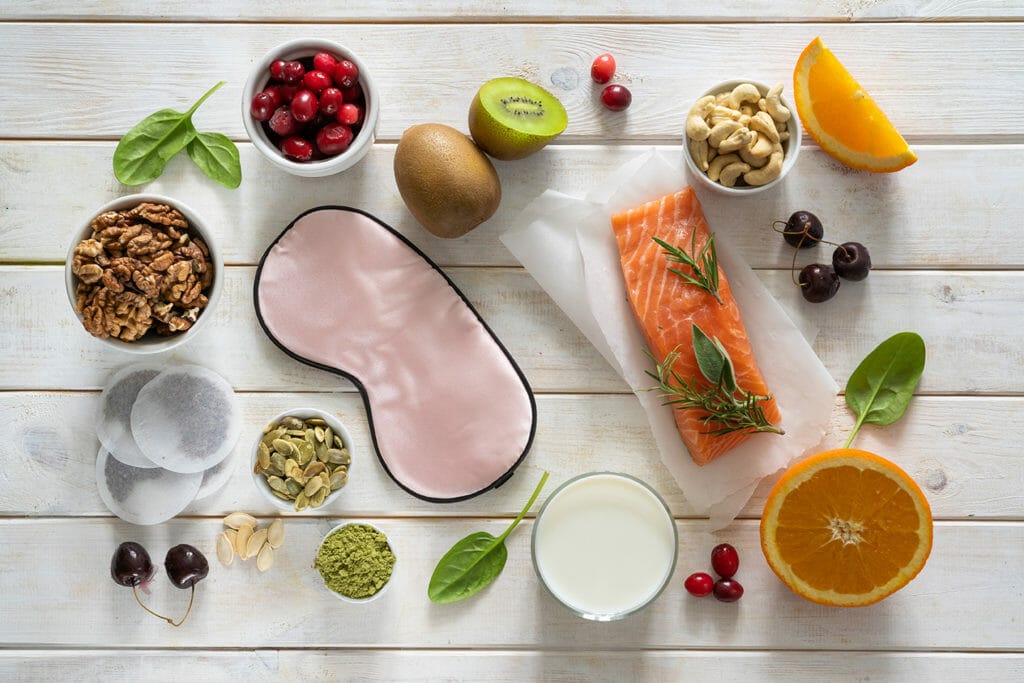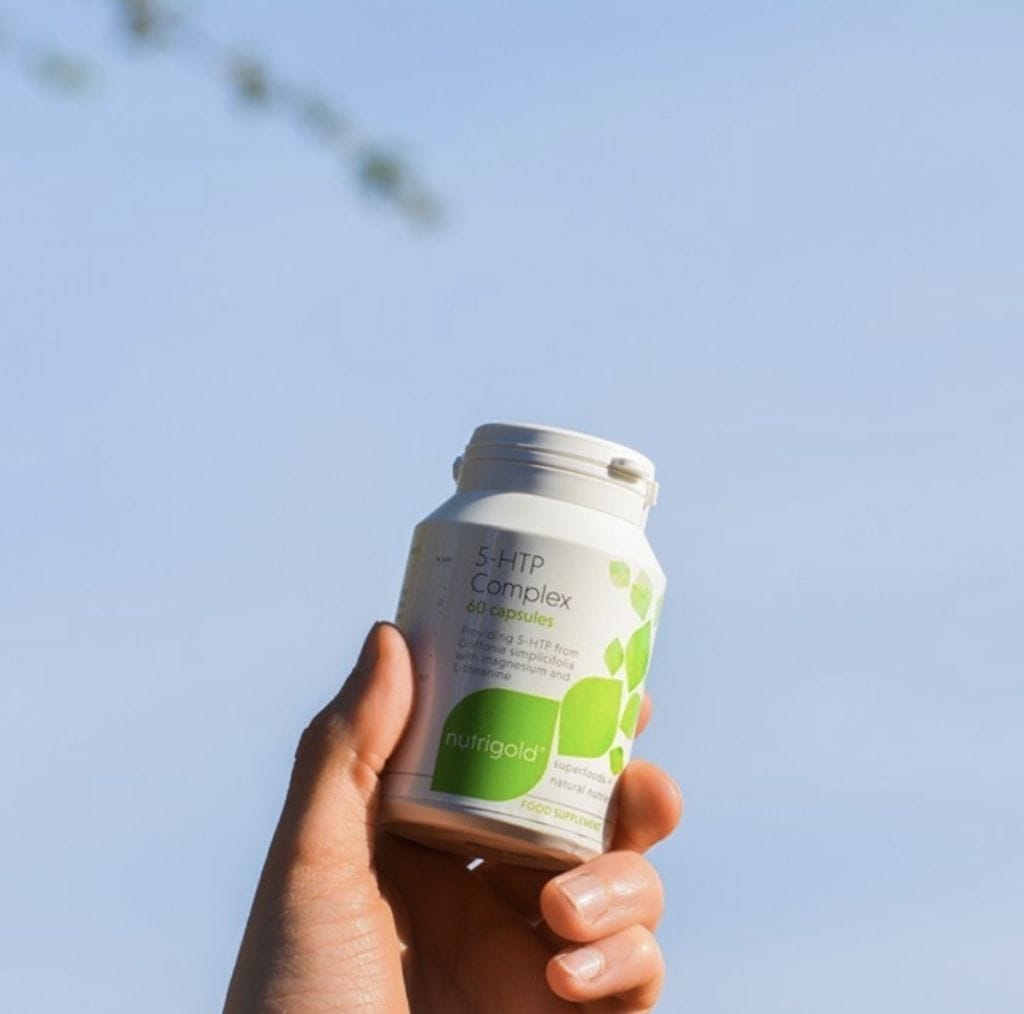Over 16 million adults experience symptoms of anxiety, depression or panic attacks each year and with the pandemic fallout, mental health issues have significantly increased across all age groups. Anxiety has its roots in biochemical changes throughout the body from gut to the brain and common co-morbid symptoms include insomnia, Irritable Bowel Syndrome (IBS), and a whole complex of feelings from worthlessness to agoraphobia. So how can we take a natural approach to manage anxiety?
One of the main systems in the gut and the brain runs through the chemical messenger serotonin, aka the “happiness hormone”. And in anxious people, serotonin levels have been shown to be low in both the digestive tract and the central nervous system. This can then lead to symptoms such as:
- Poor sleep – serotonin is a precursor to melatonin – the sleep and cell repair hormone released at night time that controls a health sleep –wake cycle.[1]
- Low mood – serotonin controls and stabilises mood and emotional pathways in the brain.[2]
- IBS – serotonin regulates digestive processes like bowel muscle motility and how sensitive your intestines are to pain; and is the major chemical messenger in the enteric nerves system – the nerves that directly connect your gut and brain including the vagus nerve.[3]
- Cravings, binge eating & weight gain – low serotonin can lead to cravings for carbohydrates, alcohol and even drugs, as mood is low and blood sugar control is poor.[4],[5]
- Headaches & migraines – low serotonin has been linked to some forms of tension headaches and migraines.[6]
- Pain – low serotonin levels have been measured in people suffering from complex fibromyalgia type pain.[7]
In fact, over 95% of the body’s serotonin is produced in the gut, so it’s no wonder when you’re anxious you’ll experience systemic feelings, everything from “butterflies in the stomach” to IBS type symptoms, it is not just “all in the head”.

Naturally Raising Serotonin
Serotonin is produced through a pathway that starts with the amino acid tryptophan, which can be found in foods such as egg white, turkey, lamb, chicken, milk, nuts, oats, and cheese and superfoods such as seaweed and spirulina. Tryptophan is then converted into 5-HTP (5-hydroxytryphtophan) and on into serotonin then melatonin, with all stages requiring specific enzymes and their co-factors iron, magnesium, vitamin B6 and folic acid.
In theory, eating tryptophan-rich foods should help your body produce enough serotonin (and melatonin), but tryptophan does not easily cross the blood-brain barrier. In fact, most of the available serotonin in the body is found in the intestines and it cannot easily cross the blood-brain barrier to help in the production of brain-derived serotonin for mood and emotional stability, and melatonin for sleep.
So how can we ensure we’re getting enough of the serotonin precursors? One of the best ways to naturally boost serotonin is to supplement with 5-HTP derived from the seeds of an African shrub known as Griffonia simplicifolia. Human studies show that 5-HTP supplements significantly reduce feelings of anxiety[8] and improve the time it takes to fall asleep, increase sleep duration and improves sleep quality[9]: All key factors in helping to reduce feelings of anxiety.

How to Choose a 5-HTP Supplement
Here are two suggestions for what to look for when choosing a 5-HTP supplement:
1. Look for 5-HTP made from natural sources. The best 5-HTP herbal supplements are derived from Griffonia Seed Extract.
2. Make sure that the 5-HTP natural supplement you decide on is combined or “stacked” with other ingredients that work with it synergistically. For example, 5-HTP conversion to serotonin requires magnesium and vitamin B6 co-factors, so supplements that contain the active forms of B6 (as P5P) and magnesium in citrate form may help boost 5-HTP efficacy.
And, because 5-HTP is metabolised quickly by the body, you shouldn’t have to wait long to notice the positive impact.
Managing Anxiety Through Lifestyle
Don’t forget that exercise and relaxation techniques like meditation can alter your serotonin levels enough to have a positive impact on your symptoms. What we do, think and say all have an impact on our nervous system, including the vagus nerve, so that more we can do to support serotonin and these nervous system pathways through meditation, practising mindfulness and identifying the root cause of the anxiety the better chance we have of naturally managing anxiety in the long-term.
For more information about a functional medicine approach to managing anxiety then join Dr Elisabeth Philipps nutrihub webinar on “Managing the Anxious Mind”.

Dr Elisabeth Philipps PhD BSc (Hons) BSc Nutr Med AFMCP
Dr Elisabeth Philipps is a clinical neuroscientist and functional medicine practitioner and runs a health consultancy specialising in brain health, the endocannabinoid system and phytocannabinoids including C*B*D and medicinal cannabis. She regularly presents at conferences and events and provides expert opinion for the national press, specialist healthcare publications and health companies. You can connect with Elisabeth via:
www.drelisabethphilipps.com | Instagram – @drelisabethphilipps | Twitter – @drphilipps | Linked In – Dr Elisabeth Philipps
[1] Shell W, Bullias D, Charuvastra E, May LA, Silver DS. A randomized, placebo-controlled trial of an amino acid preparation on timing and quality of sleep. Am J Ther. 2010 Mar-Apr;17(2):133-9.
[2] Graeff FG, Guimarães FS, De Andrade TG, Deakin JF. Role of 5-HT in stress, anxiety, and depression. Pharmacol Biochem Behav. 1996 May;54(1):129-41.
[3] Caruso I, Sarzi Puttini P, Cazzola M, Azzolini V. Double-blind study of 5-hydroxytryptophan versus placebo in the treatment of primary fibromyalgia syndrome. J Int Med Res. 1990 May-Jun;18(3):201-9.
[4] Heisler LK, Jobst EE, Sutton GM, Zhou L, Borok E, Thornton-Jones Z, Liu HY, Zigman JM, Balthasar N, Kishi T, Lee CE, Aschkenasi CJ, Zhang CY, Yu J, Boss O, Mountjoy KG, Clifton PG, Lowell BB, Friedman JM, Horvath T, Butler AA, Elmquist JK, Cowley MA. Serotonin reciprocally regulates melanocortin neurons to modulate food intake. Neuron. 2006 Jul 20;51(2):239-49.
[5] Cangiano C, Laviano A, Del Ben M, Preziosa I, Angelico F, Cascino A, Rossi-Fanelli F. Effects of oral 5-hydroxy-tryptophan on energy intake and macronutrient selection in non-insulin dependent diabetic patients. Int J Obes Relat Metab Disord. 1998 Jul;22(7):648-54.
[6] Titus F, Dávalos A, Alom J, Codina A. 5-Hydroxytryptophan versus methysergide in the prophylaxis of migraine. Randomized clinical trial. Eur Neurol. 1986;25(5):327-9
[7] Caruso I, Sarzi Puttini P, Cazzola M, Azzolini V. Double-blind study of 5-hydroxytryptophan versus placebo in the treatment of primary fibromyalgia syndrome. J Int Med Res. 1990 May-Jun;18(3):201-9.
[8] Graeff FG, Guimarães FS, De Andrade TG, Deakin JF. Role of 5-HT in stress, anxiety, and depression. Pharmacol Biochem Behav. 1996 May;54(1):129-41.
[9] Shell W, Bullias D, Charuvastra E, May LA, Silver DS. A randomized, placebo-controlled trial of an amino acid preparation on timing and quality of sleep. Am J Ther. 2010 Mar-Apr;17(2):133-9.







